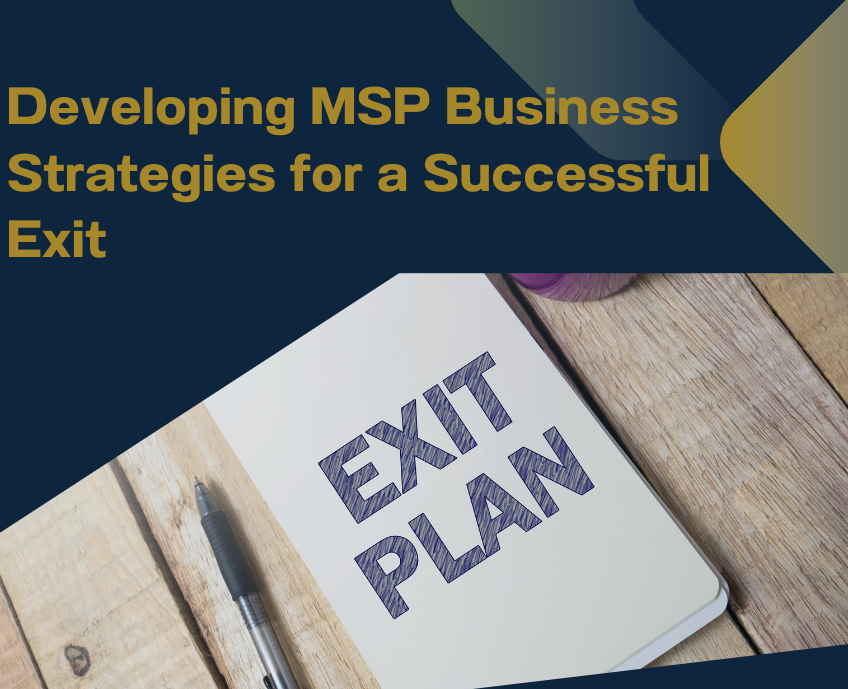As a managed service provider (MSP) business owner, you have likely spent years building your company and developing a loyal client base. However, no matter how successful your business may be, it is important to plan for the future and prepare for the possibility of an exit if you aren’t already thinking about it. Whether you are thinking about retirement, a career change, or simply want to sell your business, developing MSP business exit strategies can help ensure a smooth transition and maximize your return on investment.
Beyond just the financial value planning, developing MSP business strategies for an exit also involves considering the needs and expectations of your clients, employees, and acquirers. This may include creating a succession plan to ensure a smooth ownership transition, communicating with clients about any changes or transitions, and providing support and resources to your employees during the transition period. By taking a proactive and strategic approach to your exit planning, you can minimize potential disruptions and ensure a successful transition for all parties involved. This article details the various factors to consider when planning for a successful exit.
Optimizing Business Processes
As an MSP, optimizing your business processes is critical to achieving your exit strategy. Here’s why everything from operational efficiency and customer satisfaction to talent retention and financial management will affect the value of your business and how potential buyers will respond.
Improving Operational Efficiency
Efficiency is key to any successful MSP business. Streamlining your processes and automating routine tasks can reduce costs, improve productivity, and increase profit margins. Another way to improve efficiency is by standardizing your service offerings and implementing professional services automation (PSA) tools. By defining clear service levels and pricing structures, you can reduce the time and effort required to deliver your services while improving customer satisfaction.
Customer Satisfaction and Retention
Customer satisfaction and retention are critical to the success of any MSP business. Delivering high-quality services and providing excellent customer support is essential for building long-term relationships with your clients to increase their lifetime value.
One way to achieve this is by tracking customer interactions using customer relationship management (CRM) system for identifying opportunities for upselling, cross-selling, and measuring customer satisfaction.
You can also improve customer satisfaction by providing proactive maintenance and support. By monitoring your clients’ systems and addressing issues before they become critical, you can reduce downtime and minimize the impact on their business operations.
Financial Management for MSPs
Managing your finances effectively is essential to achieving your exit strategy. Start by monitoring your financial performance, controlling costs, and maximizing revenue to increase the value of your business and make it more attractive to potential buyers.
One way to achieve this is by consistently tracking your expenses, managing your cash flow, and generating accurate financial reports. You should also develop a pricing strategy that takes into account your costs, market demand, and competitive landscape.
Strategic Planning for MSP Exit
As an MSP business owner, it is essential to have a strategic exit plan. Developing a well-thought-out exit strategy can help you maximize your business’s value and ensure a smooth transition. Below are some key areas to keep in mind when planning your MSP exit.
Building a Saleable Asset
To prepare your MSP business for sale, it is essential to build a saleable asset. This means creating a business that is attractive to potential buyers. Key factors to consider include building a strong management team, diversifying your client base, and establishing recurring revenue streams. By building a saleable asset, you increase the likelihood of a successful exit.
Revenue Streams and Profit Margins
MSPs generate revenue through a combination of recurring and project-based services. Recurring services typically include managed services, such as network monitoring and maintenance, while project-based services include consulting and implementation. One of the most critical factors in determining the value of your MSP is the presence of a stable, recurring revenue stream. Shift your focus from one-time projects to managed services that generate predictable monthly income. Aim to build a diverse client base with long-term contracts to ensure a steady cash flow and minimize the risk of client concentration.
Additionally, profit margins for MSPs can vary widely depending on a range of factors, including the size of the MSP, the services offered, and the pricing strategy. However, as a general rule, MSPs should aim for a profit margin of at least 20% to ensure long-term sustainability.
Develop a Niche Expertise
Differentiate your MSP from the rest by developing niche expertise in a specific industry vertical or technology area. By becoming a specialist, you can command higher prices, attract more targeted clients, and build a reputation as a go-to provider in your chosen niche. This specialization can also make your MSP more valuable to potential acquirers looking to expand their offerings or enter new markets.
Cultivate Strategic Partnerships
Foster strategic partnerships with technology vendors, industry associations, and complementary service providers. These relationships can provide access to new markets, technologies, and revenue streams, as well as enhance your credibility and reputation in the industry. Look for opportunities to collaborate on joint marketing initiatives, co-branded offerings, and referral programs. Strong partnerships can not only drive growth but also make your MSP more attractive to potential buyers who value established ecosystem relationships.
Maintain Accurate Financial Records
Keep accurate and up-to-date financial records, including income statements, balance sheets, and cash flow statements. Use a reliable accounting system and implement strict financial controls to ensure the integrity and transparency of your financial data. Regularly review and analyze your financial performance to identify areas for improvement and make data-driven decisions. Potential acquirers will closely scrutinize your financial records during the due diligence process, so it’s essential to maintain a clean and accurate financial history.
Valuation Fundamentals
Valuation is a critical component of any exit strategy. Having a good understanding of the value of your business will enable you to determine an appropriate selling price. Factors that can impact your business’s value include revenue growth, profitability, customer retention, and market trends. Consider hiring a professional to help you do all the necessary due diligence.
Plan for a Smooth Transition
As you prepare for an eventual exit, develop a comprehensive transition plan to ensure a smooth handover to the new owners. Document your processes, procedures, and systems in detail to facilitate knowledge transfer and minimize disruption to operations. Communicate openly and transparently with your employees, clients, and partners about the transition process and address any concerns or questions they may have. A well-executed transition plan can help maintain the value of your MSP and ensure a successful exit.
How Call To Action Can Help
Developing a successful exit strategy for your MSP requires a multifaceted approach. By working together, I can help you position your company for a successful exit. I can work with you from the planning phase until you are ready to exit, ensuring your operations are ready for successful due diligence. Get in touch with me now for a complimentary consultation on how I can help.



